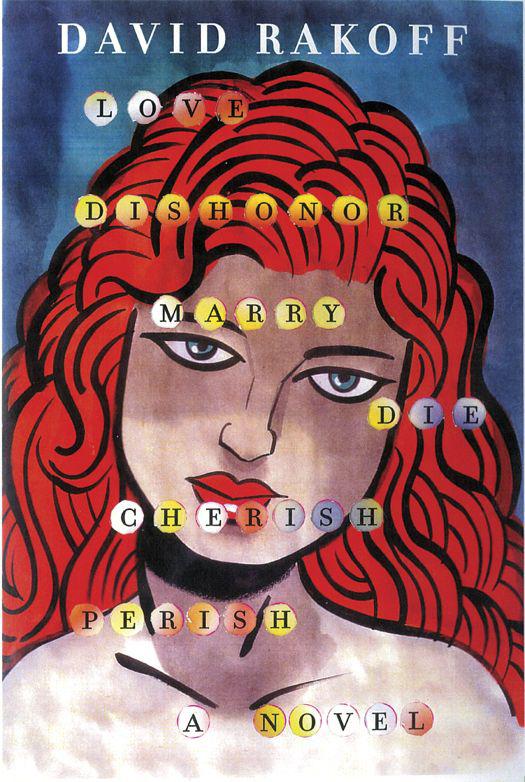
Love, Dishonor, Marry, Die, Cherish, Perish
A Novel
کتاب های مرتبط
- اطلاعات
- نقد و بررسی
- دیدگاه کاربران
نقد و بررسی

May 27, 2013
In this novel, written in verse, each brief chapter introduces a different character, living in a different era, sometimes in a different city. The effect is mesmerizing, as both the cadence of the couplets and the connections that link the characters become more established and familiar. Rakoff (Half-Empty), a frequent This American Life contributor and winner of the Thurber Prize for American Humor, who died in the summer of 2012, combines his wit and his gravity for an unexpected blend of uncomfortable rhymes that build into recognizable stories. In one of the most intriguing chapters, Helen is a secretary seduced by her boss and then transferred once she needs an abortion: “She asked if he’d ever again say Hello,/ Fedora’d and coated and ready to go/ He took a step backward as if sensing danger/ And fixed her with eyes of a cold-blooded stranger.” Astounding, too, is how effectively an entire century is captured in these slices of daily life—how each era both defines and inspires those within its grasp. Agent: Irene Skolnick, Irene Skolnick Literary Agency.

May 15, 2013
This short novel of rhyming verse might be better read aloud, if only the author were still alive to read it. The late essayist for NPR's This American Life, Rakoff (Half Empty, 2010, etc.) was accustomed to writing for the ear, but never has his writing seemed more designed to be heard than here. The posthumous publication provides a fitting memorial to a humorist whose embrace of life encompassed its dark side and who died of cancer in 2012 at age 47. Written in anapestic tetrameter--most familiar from " 'Twas the Night Before Christmas" and most commonly associated with light comedy--this novel of interlocking stories nevertheless deals with rape, abortion, adultery, homophobia, AIDS, dementia and death. It's like a child's bedtime story that you would never read to children, yet it retains a spirit of sweetness and light, even as mortality and inhumanity provide a subtext to the singsong. "If it weren't so tragic, it could have been farce," he writes of an early blooming 12-year-old girl who attracts plenty of unwanted attention, including that of her brutish stepfather, and then finds herself blamed before escaping to something of a happy ending. The bittersweet center of the novel is a young boy who discovers both his artistic talent and his homosexuality, lives a life that is both rich and short, and dies just a little younger than the author did. Some of the rhymes read like doggerel ("crime it...climate," "Naugahyde...raw inside") and some of the laughs seem a little forced, but the author brings a light touch to deadly serious material, finding at least a glimmer of redemption for most of his characters. Strong work. It deepens the impact that this was the last book completed by the author.
COPYRIGHT(2013) Kirkus Reviews, ALL RIGHTS RESERVED.

July 1, 2013
Rakoff, the best-selling author of Half Empty (2010), brings his thoughtful and tender perspective on life to this wonderfully funny yet heartbreakingly sad novel-in-verse. Throughout this rhyming novel, he crosses decades, telling the great American story through memorable characters loosely linked by acts of kindness or callousness. For example, a young runaway unfairly banished from her home finds unlikely comfort with a vagabond. Each chapter serves up a slice of life's victories, discoveries, cruelties, and casualties, such as when a young man discovers sexual freedom in 1960s San Francisco only to later tend to friends ravaged by AIDS. This novel begs to be read aloud in the mode of Rakoff's frequent and popular radio appearances on NPR's This American Life. Although, sadly, we won't be hearing new works from Rakoff, who died in August 2012, fans of the award-winning author will embrace with particular appreciation this final lesson on how to accept life's blessings and blows.(Reprinted with permission of Booklist, copyright 2013, American Library Association.)

February 15, 2013
A self-proclaimed gay Jewish Canadian-turned-New Yorker, recently deceased at age 47, Rakoff wrote bitingly funny essays that appeared both in print and on the air. This novel in verse sweeps through 20th-century America, with characters ranging from a daughter of Irish slaughterhouse workers in early 1900s Chicago, a young woman whose 1950s Manhattan office reeks of sexism, friends and lovers dying of AIDS, and, as the new century opens, a man who finds peace in an old photograph. This will be much-discussed by smart readers.
Copyright 2013 Library Journal, LLC Used with permission.

July 1, 2013
Rakoff is well known for his humorous essays (Fraud; Don't Get Too Comfortable; Half Empty) and appearances on the radio program This American Life. In his newest book, a novel in verse, Rakoff displays great facility with rhyme and meter without losing any of his signature droll sense of humor. The book collects stories of characters and place thematically woven and punctuated by illustrations; they are biting (of course!) and mostly light, with a striking gentleness in the narrator's voice. In one story, a man sits with his aging mother, who doesn't recognize him: "He'd thought that her being alive would defray/ His sadness, but all this goodbye without going away/ This brutal, unsightly, and cold disappearing/ Was so beyond what he'd conceived ever fearing;/ A stupid, but not less dispiriting coda/ To be slapped by his mother, who wanted his soda." In another, a runaway learns that the cruel world contains kindnesses. And those are just two! VERDICT Verse seems the perfect style for the trifecta of Rakoff's humor, intelligence, and humanity. Readers who prefer their prose without stanzas may want to experiment by starting here. [See Prepub Alert, 1/25/13.]--Stephen Morrow, Hilliard, OH
Copyright 2013 Library Journal, LLC Used with permission.

























دیدگاه کاربران